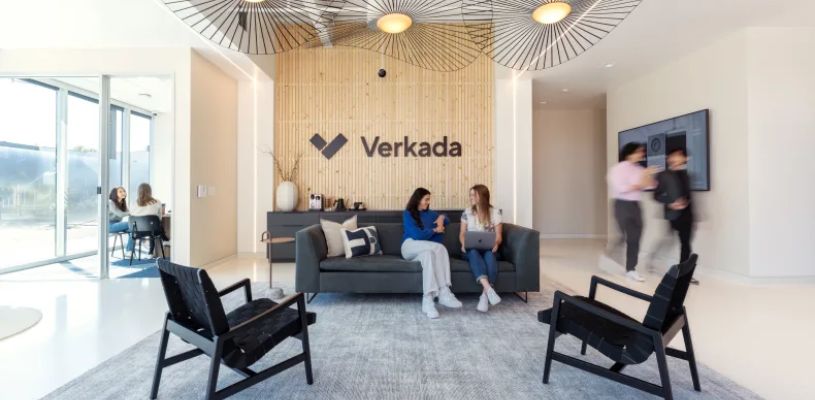Verkada Interview Process - A Detailed Guide
Discover the comprehensive Verkada interview process with our expert guide. Get insights, tips, and strategies to ace your Verkada job interview.

Verkada is a fast-growing tech company that specializes in creating cutting-edge physical security systems, including cameras, access control systems, and environmental sensors
Front-end engineers are flocking to the company to join its crew of innovative thinkers, and its interview process is becoming increasingly competitive. We’re here to help you ensure you’re ready for Verkada's rigorous front-end engineer interview process and show off your skills.
In this guide, we’ll provide tips for acing the interview, touching on common mistakes to avoid, and reviewing some of Verkada’s most frequently asked questions.
So, let’s get started.
Verkada Hiring Process Overview
The hiring process typically involves a phone interview with a recruiter and subsequent interviews with team members or managers. Candidates may be invited for onsite interviews, and recruiters are known for being helpful and responsive.
However, some reports have been of inconsistent interview questions and a lack of feedback for unsuccessful candidates. Overall, the interview experience at Verkada is regarded as positive and professional.
Here’s What Verkada Interviewees Say
On average, interviewees report a positive experience interviewing at Verkada. The process isn’t overly difficult, and the interviewers are (generally) friendly and knowledgeable.

Despite the overall positive experience, there have been reports of recruiters not providing feedback to unsuccessful candidates and reports of ghosting candidates after setting up interviews. Most interviewees suggest being proactive about communication and scheduling, a weak point with the Verkada recruitment team.
Verkada Frontend Interview Stages & Timeline
The Verkada front-end interview process takes about is broken up into three stages:
- Recruiter Screen: A 30-45 minute chat with a recruiter.
- Technical Screen: A 45-60 minute conversation with a senior front-end engineer.
- Onsite Interviews: Approximately 3-6 onsite (or virtual onsite) interview rounds (20–45 minutes each).
The entire process (from application to decision) can take 3 weeks to 2 months. A decision will generally take 2 weeks after your last interview.
Verkada Software Developer Interview Stages
Now, let’s look at each stage in a bit more depth.
Stage 1: Recruiter Screening
This is a short, friendly chat with a recruiter who wants to learn more about you. The primary objective is to introduce you to Verkada's mission and ensure there's a mutual fit between your career goals and the company's needs.
Note: It's worth mentioning that some candidates, especially those applying for senior front-end positions, might skip this stage and proceed directly to the technical screening. This typically occurs when your first interview is scheduled with an engineering team member.
Would you like a 4 day work week?
Stage 2: Technical Screening
This is a short, virtual screening interview with a technical focus. It’s conducted by a senior engineer and designed to assess your programming skills.
Most interviewees report a simple LeetCode or a system design question, like:
- Design a [product] system that can handle X requests per second.
Or:
- Write a function that will take in an array of integers and output the most significant number.
You may also get a few coding questions. In any case, the goal is to understand how you think and approach problems. Talk through your answers, and don’t be afraid to ask clarifying questions as long as you progress based on the answers you receive.
Stage 3: Onsite Interviews
The onsite interview stage will likely be the most intensive. The interview will take place if you live near a Verkada office. They’ll probably arrange a virtual session with your interviewer(s) if you live remotely.
During onsite or remote interviews, you can expect to spend 4–6 hours (across 3–6 interviews) speaking with different engineering team members. This process varies quite a bit, but most candidates report:
- A technical presentation.
- A whiteboarding discussion about your design, coding, or project work.
- A live coding session with a problem to solve on the spot.
The remaining sessions are hard to predict, but they will likely be technical, followed by a behavioral interview to conclude the day.
How do you Ace the Verkada Front-end Interview Process?

1. Do Some Research
Before your interview, take some time to learn about Verkada, its products, and its culture. This will show your interviewer that you are interested in the company and have done your homework.
2. Practice Coding Exercises
Make sure you are comfortable coding in various languages and frameworks. Verkada uses various front-end technologies, so be prepared to discuss your experience.
3. Explain Your Projects
Be prepared to talk about your past projects in detail. Be able to explain the challenges you faced, the solutions you implemented, and the results you achieved. The STAR method is a good one to know for this:
- Situation: Describe the context of the project.
- Task: Explain what you were responsible for doing.
- Action: Describe your steps to complete the task.
- Result: Detail what outcome was achieved by your actions.
4. Be Positive and Enthusiastic
Show your interviewer that you are excited about the opportunity to work at Verkada. This will make a positive impression and help you to stand out from other candidates.
5. Ask Relevant Questions
Ask relevant questions to show your interest in the company and your future role. This will allow you to further engage with the interviewer, gain more insight about the company, and demonstrate your enthusiasm for the role.
6. Show Off Your Ability to Work in a Team
Verkada values teamwork and collaborative efforts. Be prepared to share examples of your past experiences working as part of a team, detailing your contributions and how you dealt with any challenges during the process.
Verkada 15 Important Interview Questions
- Can you discuss a recent project you worked on and the specific challenges you faced in the front-end development?
- How do you ensure the performance and responsiveness of an application across different devices and browsers?
- What are your thoughts on the latest trends and best practices in front-end development, and how do you stay updated with them?
- Can you explain the process of optimizing a web application for accessibility and why it's important?
- Have you worked with any specific front-end frameworks or libraries, and what do you consider their advantages and disadvantages?
- How would you approach debugging and troubleshooting a complex front-end issue in a production environment?
- Can you describe a situation in which you had to make a significant architectural decision in a front-end project, and what factor was considered in making that decision?
- What is your experience implementing and consuming RESTful APIs in front-end applications?
- How do you ensure the security of a front-end application, and what are the common security considerations in front-end development?
- Can you discuss your experience with performance optimization techniques in front-end development, such as lazy loading, code splitting, or caching strategies? How do you approach writing clean, maintainable, and scalable front-end code and ensure code quality in a team environment?
- Have you worked on integrating data visualization or charting libraries into a front-end application, and what were the key challenges you faced?
- How do you handle state management in large-scale front-end applications, and what are the trade-offs between different state management solutions?
- Can you discuss your experience with responsive and mobile-first design principles in front-end development?
- What tools and workflows do you use for front-end testing, and how do you ensure adequate project test coverage?
Wrapping Up
Acing the Verkada interview process is all about preparing well and staying calm. If you know your stuff, the interviews probably won’t be more challenging than any other job. Just emphasize the specific skills you possess that can help Verkada succeed.
And if you’re looking to improve your work-life balance, you can explore front-end engineering jobs at 4dayweek.io. We connect you with opportunities that offer flexible work arrangements, allowing you to enjoy life's pleasures without sacrificing your career advancement.
